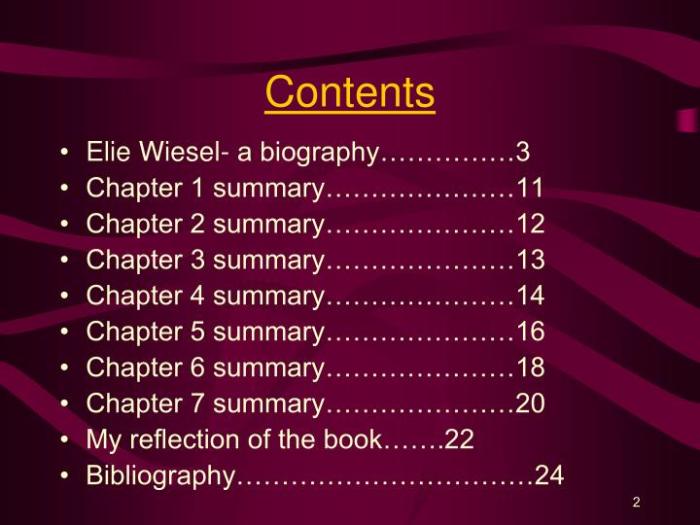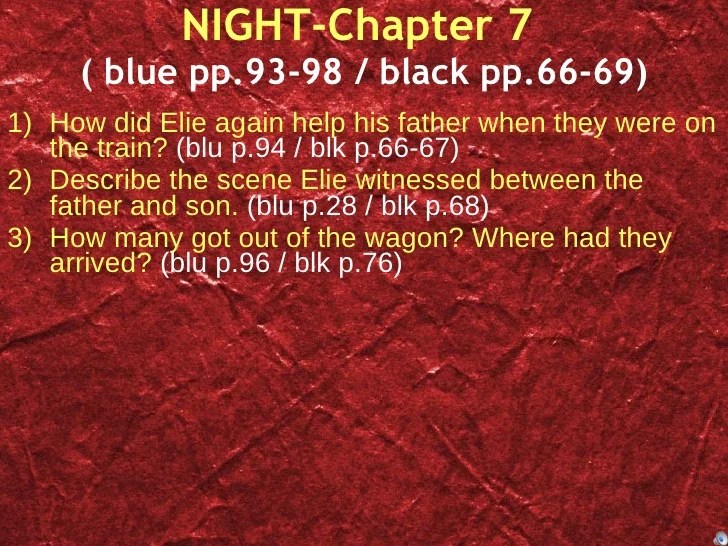Chapter 2 of night by elie wiesel – In Chapter 2 of Elie Wiesel’s seminal work, Night, readers are thrust into the harrowing depths of the Holocaust through the eyes of Eliezer, a young Jewish boy. This chapter marks a pivotal turning point in the narrative, as Eliezer’s innocence is shattered, and the horrors of the Nazi regime are laid bare.
Wiesel’s masterful use of symbolism, imagery, and character development paints a vivid and unforgettable portrait of the Holocaust’s atrocities, forcing readers to confront the ethical and moral implications of this dark chapter in human history.
Elie Wiesel’s Personal Experiences
Chapter 2 of Nightholds profound significance for Elie Wiesel’s personal experiences during the Holocaust. It captures the initial shock and horror he endured upon arriving at Auschwitz, marking a pivotal turning point in his life. The chapter vividly depicts the dehumanizing process he and other prisoners underwent, stripping them of their identity and dignity.
Emotional and Psychological Impact
The events depicted in Chapter 2 had a profound emotional and psychological impact on Wiesel. The chapter conveys the unimaginable suffering and terror he endured, from the separation from his family to the horrors of the concentration camp. Wiesel’s raw and honest account of his experiences provides a powerful insight into the human capacity for resilience and the enduring effects of trauma.
Symbolism and Imagery

Wiesel employs powerful symbolism and imagery in Chapter 2 to enhance the chapter’s themes and convey the horrors of the Holocaust. The use of metaphors and similes creates a vivid and haunting portrayal of the camp’s brutality.
Fire and Darkness
Fire and darkness are recurring symbols throughout the chapter, representing the destructive and oppressive forces at work in Auschwitz. The flames of the crematorium symbolize the mass murder and suffering endured by the prisoners, while the darkness represents the moral and spiritual void that permeated the camp.
Character Development: Chapter 2 Of Night By Elie Wiesel
Chapter 2 marks a significant turning point in Eliezer’s character development. As he witnesses the atrocities of the camp, he undergoes profound changes in his beliefs and understanding of the world.
Loss of Faith
Eliezer’s faith in God is severely tested in Chapter 2. The horrors he witnesses challenge his belief in a benevolent and just deity, leading him to question the existence of God and the meaning of life.
Maturation and Resilience
Despite the trauma he endures, Eliezer also exhibits remarkable maturity and resilience. He learns to adapt to the harsh conditions of the camp and finds ways to maintain a sense of humanity amidst the brutality.
Historical Context

Chapter 2 is set against the backdrop of the Holocaust, one of the darkest chapters in human history. It provides a firsthand account of the systematic genocide perpetrated by the Nazis against the Jewish people.
The Significance of Auschwitz, Chapter 2 of night by elie wiesel
Auschwitz, the largest Nazi concentration camp, serves as a chilling reminder of the horrors of the Holocaust. The chapter vividly depicts the camp’s inhumane conditions, the brutality of the guards, and the dehumanizing treatment of the prisoners.
Literary Techniques
Wiesel employs a range of literary techniques in Chapter 2 to enhance the chapter’s impact and convey the horrors of the Holocaust.
Foreshadowing and Flashbacks
Wiesel uses foreshadowing to hint at the horrors that lie ahead for Eliezer and the other prisoners. He also employs flashbacks to provide context and insights into Eliezer’s past experiences.
Sensory Details and Figurative Language
Wiesel’s use of vivid sensory details and figurative language creates a visceral and immersive experience for the reader. He employs similes, metaphors, and other literary devices to convey the unimaginable suffering and terror endured by the prisoners.
Ethical and Moral Implications
Chapter 2 raises profound ethical and moral implications about the nature of humanity and the responsibility of individuals in the face of evil.
The Question of Good and Evil
The chapter challenges readers to confront the question of good and evil. It forces us to grapple with the depths of human depravity and the resilience of the human spirit.
Responsibility and Indifference
Wiesel explores the themes of responsibility and indifference in Chapter 2. He questions the role of bystanders in the face of atrocity and challenges readers to reflect on their own moral obligations.
Frequently Asked Questions
What is the significance of the dream Eliezer has in Chapter 2?
The dream foreshadows the horrors that await Eliezer and his fellow prisoners, symbolizing the loss of innocence and the descent into darkness.
How does Eliezer’s relationship with his father change throughout Chapter 2?
As the brutality of the camp intensifies, Eliezer’s bond with his father weakens, reflecting the erosion of hope and humanity.
What is the significance of the selection process depicted in Chapter 2?
The selection process highlights the Nazis’ dehumanizing treatment of prisoners, reducing them to mere numbers and objects.